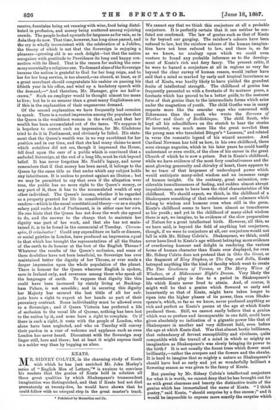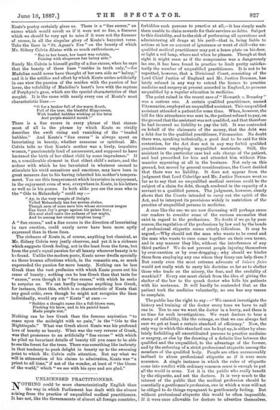KEATS.
MR. SIDNEY COLVIN, in the charming study of Keats with which he has just enriched Mr. John Morley's series of "English Men of Letters,"* is anxious to convince his readers that the genius of Keats held in solution all those great qualities by which Shakespeare's transcendent imagination was distinguished, and that if Keats had not died prematurely at twenty-five, he would have shown that he could follow with no unequal step in the great master's track.
• Published 17 Ilsomillsa sad Co.
We cannot say that we think this conjecture at all a probable conjecture. It is perfectly certain that it can neither be con- futed nor confirmed. The law of genius such as that of Keats is far beyond our ganging. The rainbow's colours have been reduced to law, bat the rainbow colours of the human imagina- tion have not been reduced to law, and there is, so far as we know, no analogy upon which we could even venture to found any probable inference as to the develop- ment of Keats's rich and fiery fancy. The present critic, if he were to hazard a conjecture at all in regions so very far beyond the clear survey of human reason, would :rather have said that a mind so marked by early and tropical luxuriance as that of Keats, was hardly likely to have yielded the grandest fruits of intellectual strength. The childhood of genius has frequently presented us with a foretaste of its maturer years, a foretaste which has proved to be a better guide, to the maturer form of that genius than to the intermediate forms which arise under the magnetism of youth. The child Goethe was in many respects more like the oracular sage who conversed with Eckermann than the youth who wrote the Sorrows of Werther and Goetz of Berlichingen. The child Scott, who kept all his schoolfellows on the stretch to hear the stories he invented, was much more like the great novelist than the young man who translated Burger's "Leonora," and related in verse the romantic legend of his wizard ancestor. And Cardinal Newman has told us how, in his own childhood, there were strange auguries, which in his later years he could hardly understand or even credit, of the close of his career in the great Church of which he is now a prince. But in Keats's childhood, while we have evidence of the most fiery combativeness and the most glowing generosity and chivalry of heart, there appears to be no trace of that largeness of undeveloped power which would anticipate many-sided wisdom and an immense range of human insight. On the contrary, great animation, con- siderable tumultuousness of feeling, and sudden almost abrupt impulsiveness, seem to have been the chief characteristics of his childhood. We should expect, we think, in the childhood of a Shakespeare something of that sedateness and calmness which belong to wisdom and humour even when still in the germ. Keats's childhood seems to have been almost as tumultuous as his youth ; and yet in the childhood of many-sided wisdom there is apt, we imagine, to be evidence of the slow preparation of Nature for a great intellectual birth. However, all this, as we have said, is beyond the field of anything bat conjecture, though, if we were to conjecture at all, our conjecture would not fall in with Mr. Sidney Colvin's. Shakespeare, we think, could never have lived to Keats's age without betraying more evidence of overflowing humour and delight in rendering the various forms of human character than Keats ever displayed, for even Mr. Sidney Colvin does not pretend that in Othe the Great, or the fragment of King Stephen, or The Cap and Belle, Keats betrayed anything like the kind of faculty which went to create The Two Gentlemen of Verona, or The Merry Wives of Windsor, or A Midsummer Night's Dream. Very likely the last-mentioned play is due to a period in Shakespeare's life which Keats never lived to attain. And, of course, it might well be that a genius which flowered so early and luxuriantly as that of Keats, might have taken longer to ripen into the higher phases of its power, than even Shake- speare's, which, so far as we know, never produced anything so rich and perfect as Keats's poems at the age at which Keats produced them. Still, we cannot easily believe that a genius which was so profuse and incomparable in one field, could have given absolutely no indication of a gigantic power like that of Shakespeare in another and very different field, even before the age at which Keats died. Was that almost hectic brilliance, that redundancy of fervent susceptibility and vividness, quite compatible with the travail of a mind in which so mighty an imagination as Shakespeare's was slowly bringing its power to the birth P It is not usually the forest trees which flower most brilliantly,—rather the creepers and the flowers and the shrubs. It is bard to imagine that so mighty a nature as Shakespeare's should have had so early and yet so wonderfully brilliant a flowering season as was given to the fancy of Keats.
But passing by Mr. Sidney Colvin's intellectual conjecture for what it is worth, we cannot deny that he has brought out for us with great clearness and beauty the distinctive traits of the genius which has immortalised the name of Keats. "I think poetry," said Keats, "should surprise by a fine excess ;" and it would be impossible to express more exactly the surprise which Keats's poetry certainly gives ns. There is a "fine excess," an excess which would revolt us if it were not so fine, a fineness which we should be very apt to miss if it were not the fineness of excess, in all the singular glory of Keate's happiest verse. Take the lines in "St. Agnes's Eve" on the beauty of which Mr. Sidney Colvin dilates with so much enthusiasm,—
" But to her heart, her heart was voluble,
Poising with eloquence her balmy side."
Surely Mr. Colvin is himself guilty of a fine excess, when he says that the beauty of these lines "resides in truth only,"—for Madeline could never have thought of her own side as" balmy," and it is the artifice and effort by which Keats unites artificially in one view the passion of the maiden with the passion of her lover, the volubility of Madeline's heart's love with the rapture of Porphyro's gaze, which are the special characteristics of that couplet. It is the eame with nearly every one of Keats's most characteristic lines :— "0 for a beaker fall of the warm South,
Fall of the true, the blushful Hippocrene, With beaded bubbles winking at the brim And parple.stained mouth I"
There is a fine excess in every phrase of that stanza. most of all iu the phrase by which Keats so vividly describes the swift rising and vanishing of the 'beaded bubbles." And Keats's "fine excess" is always spent on luxuriating in beauty, whether sensuous or spiritual. Mr. Colvin tells us that Keats's mother was a lively, impulsive woman," passionately fond of amusement, and supposed to have hastened the birth of her eldest child by some imprudence." If so, a considerable element in that eldest child's nature, and the ardour with which he too luxuriated in whatever seemed to stimulate his vivid sensations and emotions, may have been in great measure due to his having inherited his mother's tempera- ment. You see this temperament which luxuriates in enjoyment, in the enjoyment even of woe, everywhere in Keats, in his letters as well as in his poems. In both alike you see the man who in the "Ode to Melancholy" could say :— "Ay, in the very temple of Delight
Veiled Melancholy has her sovrau shrine, Though seen of none save him whose strenuous tongue Can burst Joy's grape against his palate floe; His soul shall taste the sadness of her might, And be among her cloudy trophies hang.'
A "fine excess," and a fine excess in the direction of luxuriating in rare emotion, could surely never have been more aptly expressed than in these lines.
The richness of Keats is, of course, anything but classical, as Mr. Sidney Colvin very justly observes, and yet it is a richness which suggests Greek feeling, not in the least from the form, but from the poet's equal passion for all beauty wherever beauty into b3 found. Unlike the modern poets, Keats never dwells specially oz those human affections which, in the romantic era, so much superseded the passion for mere beauty. Nothing can be less Greek than the vast profusion with which Keats pours out his sense of beauty ; nothing can be less Greek than that taste for "excess," even though it be "fine excess," with which he seeks to surprise us. We can hardly imagine anything less Greek, for instance, than this, which is so characteristic of Keats that any good critic, even though he might not recognise the lines individually, would cry out " Keats " at once :— "Sadden a thought came like a fall-blown rose,
Flushing his brow, and in his pained heart Made purple riot."
Nothing can be less Greek than the famous aspiration "to cease upon the midnight with no pain," in the "Ode to the Nightingale." What was Greek about Keats was his profound love of 'beauty as beauty. What was the very reverse of Greek, was that proneness to an artificially "fine excess" with which he piled up luxuriant details of beauty till you cease to be able to seethe forest for the trees. There was something like inebriety in that tendency to push delight in beauty up to the swooning point to which Mr. Colvin calls attention. Bat say what we will in attenuation of his claims to admiration, Keats was "a priest to all time," if not of the wonder, at least of "the bloom of the world," which " we see with his eyes and are glad."



































 Previous page
Previous page